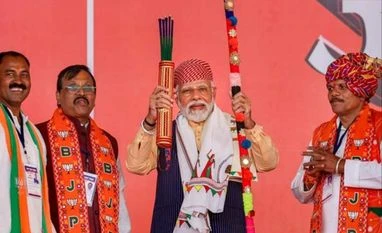Rivals BJP and Congress are extensively campaigning in Chhattisgarh, Madhya Pradesh and Rajasthan to win the tribal vote in three states in the midst of elections.
This campaign comes at a crucial time, as the states going to the polls have a substantial tribal population.
CHHATTISGARH
As many as 29 seats in Chhattisgarh's 90-member state legislative assembly are reserved for scheduled tribes (STs). Twelve of the 20 seats that have already been polled in the first phase of voting on November 17 were reserved for ST. The remaining 17 ST seats, along with 53 other seats, will witness polling on Friday in the second phase.
According to the 2011 census, the tribal community accounts for 30.60 per cent of Chhattisgarh's population. When the BJP, came to power in Chhattisgarh in the first election in the state in 2003, it got a sizable tribal vote share.
The BJP’s influence for the tribal vote dwindled in the subsequent elections of 2008 and 2013, while it retained power in Raipur. In the 2018 Assembly election, Congress won a majority of tribal seats and the BJP got four.
Concerned about this trend, BJP's top leaders, including Prime Minister Narendra Modi, Amit Shah, and JP Nadda, are stepping up efforts in the tribal belt.
When Modi was campaigning in Naxal-infested Kanker, he reminded Chhattisgarh's tribal people of the BJP's nomination of Droupadi Murmu for the presidential elections.
More From This Section
"For the first time in the history of the country, the BJP decided to make the daughter of a tribal family the President, but Congress also opposed it," said Modi, adding, “The Opposition was not against the BJP rather it was against the tribal daughter. Every tribal of Chhattisgarh has to always remember this insult of the tribal daughter and take its revenge from Congress."
MADHYA PRADESH
In Madhya Pradesh, tribal people make up 21.1 per cent of the population. Of the 230 constituencies that will go to polls on November 17, 47 are reserved for STs. In 2018, Congress won 30 of those 47 seats.
Also Read: In battle for states: BJP, Congress reach out to seers; field fewer Muslims
Also Read: In battle for states: BJP, Congress reach out to seers; field fewer Muslims
From the Rani Durgavati Gaurav Yatra in June to pay tribute to the 16th century Gond queen Rani Durgavati to renaming a railway station in Indore after Tantya Bhil, an icon of the Bhil community, the BJP has left no stone unturned in its effort to get the tribal community’s vote on November 17.
Chief Minister Shivraj Singh Chouhan's move to wash the feet of a Kol tribe man, whose harassment by the associate of a BJP leader shocked public opinion in July, demonstrated how swiftly the BJP wanted to mitigate any damage in an election year.
RAJASTHAN
Rajasthan's 13.5 per cent tribal population will be an important factor in state elections on November 25.
In the 2018 state Assembly election, the Congress won 12 of the state's 25 seats reserved for STs, while the BJP won nine. Of the remaining four, two went to independent candidates and two others were clinched by the Bharatiya Tribal Party (BTP).
Seeing its seat share among STs drop to half of what it was in 2013, the BJP has ensured special focus on ST and SC reserved seats.
In September, the BJP launched a month-long outreach campaign for Dalits and adivasis (tribals), who hold considerable sway over the 200-member legislative assembly in Rajasthan.
Prime Minister Modi's mention of revered tribal figure Govind Guru of Banswara in his 'Mann Ki Baat' address on October 30 was indicative of this outreach to the state's tribal community. He spoke of the massacre of close to 1500 Bhil tribals and forest dwellers at Mangarh Dham in Banswara by the British on November 17, 1913.
When Modi had visited Banswara last year, Chief Minister Ashok Gehlot, a Congress leader, said that there was a lot of hope that the Prime Minister would declare Mangarh Dham a national monument but he disappointed the tribal people.
Making things interesting in the tribal-dominated districts of Rajasthan is the split in the Gujarat-based Bharatiya Tribal Party (BTP), which won two seats in the last elections.
The two winning leaders, Rajkumar Roat and Ramprasad Dindsor, have now formed their own party, the Bharatiya Adivasi Party (BAP). The youth among the tribal voters have been seen gravitating towards the Bharatiya Adivasi Party, posing a tough challenge to the traditional players in the fray.
In the middle of this, the BJP is banking on anti-incumbency to defeat the Congress on November 25. The results of all poll-bound states will be declared on December 3.
)